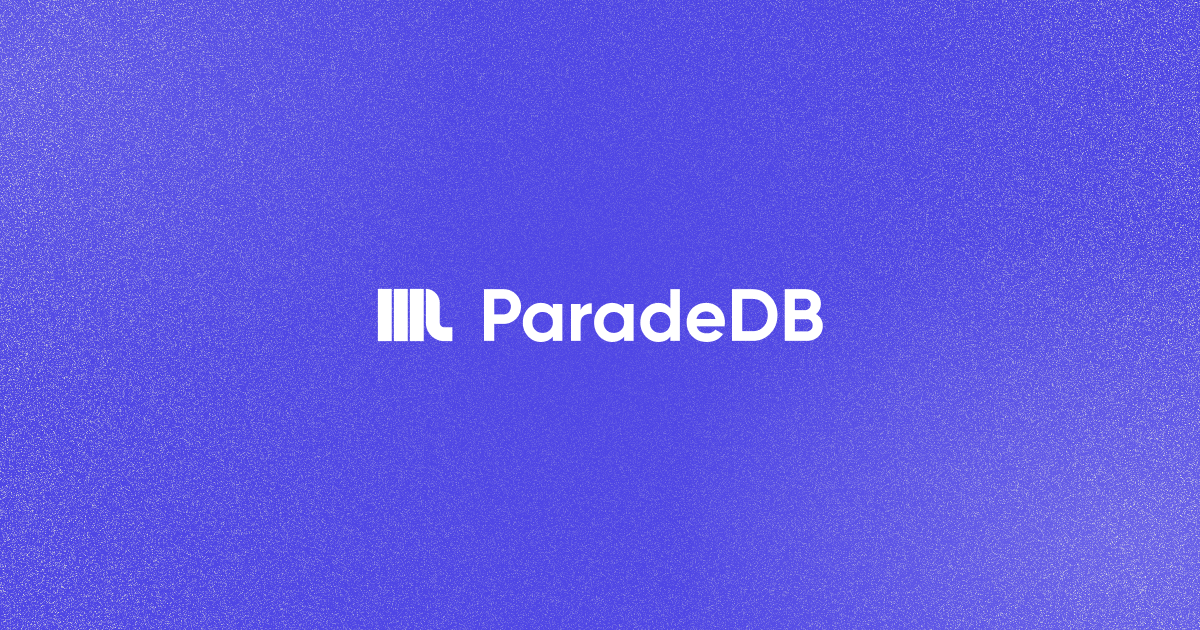
Who is ParadeDB for?
You are likely a good fit for ParadeDB if you identify with the following:- Your primary database is Postgres, either managed (e.g. AWS RDS) or self-managed
- You have used Postgres’ built-in search capabilities via
tsvectorand the GIN index, but have reached a scale where you’re limited by performance bottlenecks or missing features like BM25 scoring or fuzzy search - You are evaluating a search engine like Elasticsearch, but don’t want to introduce another cumbersome dependency to your stack
Why ParadeDB?
For teams that already use Postgres, ParadeDB is the simplest way to bring Elastic-quality search to your application.Zero ETL Required
Syncing Postgres with an external search engine like Elastic can be a time-consuming, error-prone process that involves babysitting ETL pipelines and debugging data inconsistency issues. ParadeDB eliminates this class of problems because you can:- Install the ParadeDB extension directly inside your Postgres, if it is self-managed
- Run ParadeDB as a logical replica of your primary Postgres, if you use managed Postgres providers like RDS
Search That Feels Like Postgres
In ParadeDB, writing a search query is as simple as writing SQL. ParadeDB supports JOINs, which removes the complexity of denormalizing your existing schema.As Reliable As Postgres
ParadeDB supports Postgres transactions and ACID guarantees. This means that data is searchable immediately after it’s written to ParadeDB, and durable thanks to Postgres write-ahead logging.ParadeDB vs. Alternatives
People usually compare ParadeDB to two other types of systems: OLTP databases like vanilla Postgres and search engines like Elastic.| OLTP database | Search engine | ParadeDB | |
|---|---|---|---|
| Primary role | System of record | Search and retrieval engine | System of record and search/analytics engine |
| Examples | Postgres, MySQL | Elasticsearch, OpenSearch | |
| Search features | Basic FTS (no BM25, weak ranking) | Rich search features (BM25, fuzzy matching, faceting, hybrid search) | Rich search features (BM25, fuzzy matching, faceting, hybrid search) |
| Analytics features | Not an analytical DB (no column store, batch processing, etc.) | Column store, batch processing, parallelization via sharding | Column store, batch processing, parallelization via Postgres parallel workers |
| Lag | None in a single cluster | At least network, ETL transformation, and indexing time | None in a single cluster |
| Operational complexity | Simple (single datastore) | Complex (ETL pipelines, managing multiple systems) | Simple (single datastore) |
| Scalability | Vertical scaling in a single node, horizontal scaling through Kubernetes | Horizontal scaling through sharding | Vertical scaling in a single node, horizontal scaling through Kubernetes |
| Language | SQL | Custom DSL | Standard SQL with custom search operators |
| ACID guarantees | Full ACID compliance, read-after-write guarantees | No transactions, atomic only per-document, eventual consistency, durability not guaranteed until flush | Full ACID compliance, read-after-write guarantees |
| Update & delete support | Built for fast-changing data | Struggles with updates/deletes | Built for fast-changing data |
Production Readiness
As a company, ParadeDB is over two years old. ParadeDB launched in the Y Combinator (YC) S23 batch and has been validated in production since December 2023. ParadeDB Community, the open-source version of ParadeDB, has been deployed over 400,000 times in the past 12 months. ParadeDB Enterprise, the durable and production-hardened edition of ParadeDB, powers core search and analytics use cases at enterprises ranging from Fortune 500s to fast-growing startups. A few examples include:- Alibaba Cloud, the largest Asia-Pacific cloud provider, uses ParadeDB to power search inside their data warehouse. Case study available.
- Bilt Rewards, a rent payments technology company that processed over $36B in payments in 2024. Case study available.
- Modern Treasury1, a financial technology company that automates the full cycle of money movement.
- Span1, one of the fastest-growing AI developer productivity platforms
- TCDI1, a giant in the legal software and litigation management space.